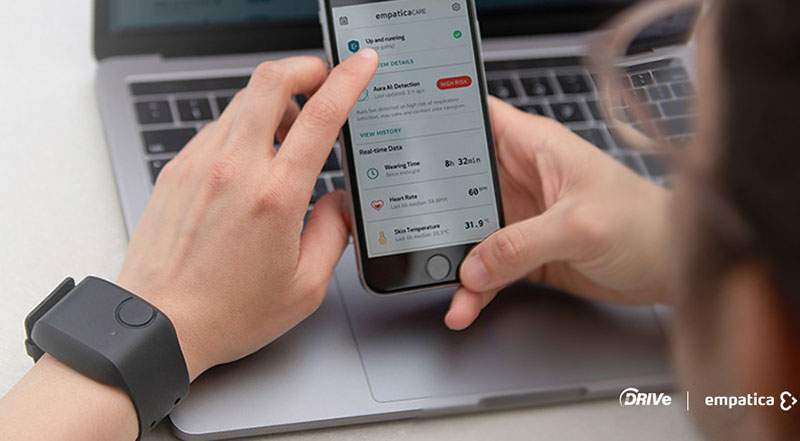Digital healthcare company Empatica announced a new partnership with the Biomedical Advanced Research and Development Authority (BARDA), part of the Office of the Assistant Secretary for Preparedness and Response at the U.S. Department of Health and Human Services (HHS), to validate an early warning system for COVID-19 and other respiratory infections using its wearable sensors and proprietary algorithm. The system, named Aura, is completely noninvasive, utilizing Empatica’s medical smartwatches, software, and artificial intelligence capabilities. Aura will enable continuous and real-time insight into the likelihood of SARS-CoV-2 infection before symptoms present, enabling them to self-isolate and seek early treatment
In February 2019, Empatica and BARDA’s Division of Research, Innovation and Ventures (DRIVe) began to develop a digital biomarker that predicts respiratory infections. Preliminary findings have been promising, showing a strong correlation between viral shedding and changes in a person’s physiology. Now Empatica will be sponsored to run a validation trial specific to early detection of COVID-19.
The aim is to validate Empatica’s algorithm in real-life settings, with the participation of healthcare workers who are exposed to a high viral load while treating hospitalized COVID-19 patients. They will wear the E4, Empatica’s medical-grade research wearable wristband, for 30 days, and their physiological data will be reviewed against daily nasopharyngeal (NP) samples and a daily qRT-PCR swab, ensuring the highest ground truth, said a press release.

Empatica CEO Matteo Lai, stated, “We are very proud to join forces with BARDA to help improve the health and safety of millions of Americans going back to work. This product introduces a new paradigm: empowering individuals and institutions with smart health monitoring, so that they will know early when they need to self-isolate and take care of themselves. Without BARDA’s leadership and foresight over the past year, our early detection algorithm would not have reached this pivotal stage of clinical validation, which will accelerate our request for FDA’s approval of Aura as a medical product for use by people at risk of contracting COVID-19.”
BARDA Acting Director, Gary Disbrow, Ph.D., added, “We anticipate that access to real-time and actionable health information will empower people to seek medical advice and care sooner, or to adopt behavioral changes such as temporary self-isolation that can help reduce the spread of COVID-19 and similar infections.”
Early detection can protect frontline workers, reduce spread, and improve the overall public health response as lockdowns ease globally. Recent estimates by CDC suggest that 35% of infections are asymptomatic, making contact tracing and containment of the virus a challenge. Meanwhile, the most infectious period could be 1 to 3 days before symptoms start, so even those patients who eventually display symptoms can still infect their family, colleagues and other people they interact with, before realizing they are ill. Digital biomarkers like Aura can help efficiently triage patients, enabling more effective care and prioritization of cases, and potentially saving lives.









